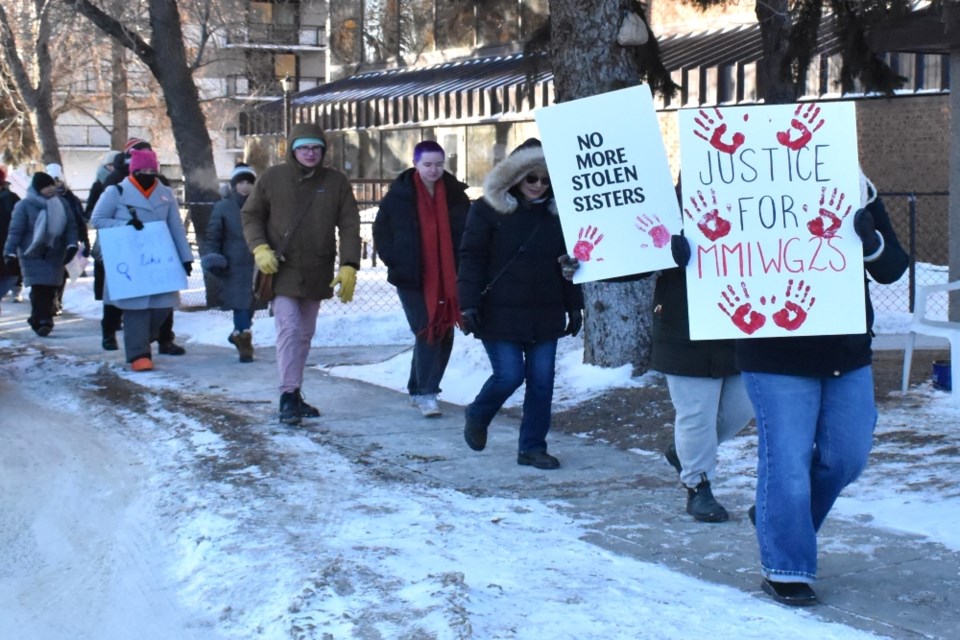SASKATOON—More than 100 women’s rights activists, advocates and community organizers braved an extreme cold warning to march through temperatures nearing -30 C on Saturday.
They made their voices heard on issues affecting women in the province, including domestic abuse and abortion rights. The march began and ended at the YWCA on 25th Street East.
Women’s March Saskatoon communications and government outreach co-ordinator Kate Lardner said the event aims to continue advocating for the rights of women and gender-diverse people not only in Saskatchewan but around the world, regardless of race, ethnicity, religion, immigration status, sexual identity, gender expression, economic status, age or ability.
“We will not tolerate any form of bigotry or ignorance. We will not let others divide us. Today [Saturday], we are here to stand united together and say enough is enough. We have had enough of not having [control] over our bodies. We have had enough of being unable to make medical decisions that make the most sense for ourselves,” said Lardner.
“We have had enough of having to fear for our safety when we walk down the street, enter our workplaces, or even go home at the end of the day. It is ridiculous that in 2025, we still have to demand the right to basic safety, the right not to be questioned about whether or not we asked to be assaulted and harassed, and the right to simply go about our lives. But here we are.”
She added that the march, which also included a separate event in Regina, is a way to take a stand, raise awareness of issues faced by women, and make a statement that there are groups of women who will not back down in the fight for their rights.
University of Saskatchewan Women and Gender Studies Department chair and professor Rachel Loewen Walker, one of the guest speakers, said Saturday’s event reminded her of the Jan. 21, 2017, Women’s March in Washington, D.C., held a day after Donald Trump’s inauguration during his first presidential term.
“It was the largest single-day protest in U.S. history, with three to five million people in attendance. And 673 marches took place worldwide on all seven continents, including Antarctica, which may have had the same temperature as today, and 29 in Canada, including one here in Saskatoon. I was at city hall, and I’m guessing others in this room were too. The streets were packed, we were loud, and the day felt incredibly powerful,” said Walker.
“It was a reminder of the power of grassroots feminist organizing and the power of social media to bring us into these spaces together. We saw that power again with the Black Lives Matter protests years later and in organizing around anti-trans rhetoric. It was among many decades of international recognition for women's rights and gender-diverse people.”
Walker, who will be the Saskatchewan NDP’s Saskatoon West candidate in the upcoming federal election, added that although the turnout at Saturday’s march in Saskatoon couldn’t match the massive crowd in Washington, D.C., eight years ago, it doesn’t mean people care less or that the movement is no longer critical.
“In some ways, the struggles we’re up against have become even more layered, more insidious. Attacks on women’s rights, anti-trans rhetoric and gender-based violence—they’re not just present; they’re pervasive, and they wear us down. Sexism and casual misogyny have become so embedded in our news, social media, conversations and daily lives that sometimes it seems impossible to change. It feels inevitable. It feels insurmountable. But I also know this: when we are weary, we are fierce.
“We are here because we recognize the danger of silence. We are here because we know how transformative it is when we fight. The roots of this movement run deep. Feminism didn’t begin on social media or at high-profile rallies. It started in quiet, unassuming places, around kitchen tables, in shared moments of courage, where people came together and shared their homes, struggles and stories.”
Caring for one another
Angie Kells, a founding member of the Saskatoon Abortion Support Network, said the organization began with the idea of relying on each other rather than the government to ensure abortion is not only legal but accessible to everyone who needs it.
“Over the years, we’ve provided community care to people who need it. Our support is free, provided by volunteers and entirely funded by the community. We don’t receive any money from corporations or governments. The support we provide is varied—it depends on what people need when they call us,” said Kells.
“Sometimes people call us because they simply don’t know how to get an abortion, and we connect them with a doctor or clinic in their community. They might have an appointment but be unable to travel to it. They might need a hotel they can’t afford or food while travelling. So, we provide the financial assistance necessary so that they can access the abortion care they need and deserve.”
She added that while abortion in Saskatchewan is legal, it isn’t accessible to everyone. For example, medication like Mifegymiso is only available up to 10 weeks, and some doctors are unwilling to prescribe it.
“Make no mistake—if a person presents with a miscarriage, those same doctors will provide that same medication. But when it’s used voluntarily, that’s when access is restricted. Can any of us imagine a world where men would need to come together to create a support network to access medication for erectile dysfunction? Right? It’s absurd. This is what SASN is doing. We are a group of people just like you,” said Kells.
“Surgical abortion is only available in Saskatoon up to 14 weeks and in Regina up to 19 weeks and six days. Anyone requiring that level of abortion care must travel to one of those cities at their own expense. In our experience, people who must travel for abortion care, particularly later in pregnancy, have often been talked out of early abortion. This is unacceptable.”




